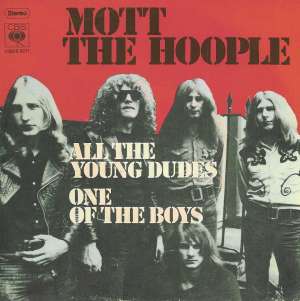 | All the Young DudesMott the Hoople |
Writer(s): David Bowie (see lyrics here) Released: July 28, 1972 First Charted: August 12, 1972 Peak: 37 US, 34 CB, 32 HR, 2 CL, 3 UK, 31 CN, 1 DF (Click for codes to charts.) Sales (in millions): -- Airplay/Streaming (in millions): -- radio, 4.2 video, 81.12 streaming |
Awards:Click on award for more details. |
About the Song:In 1972, Mott the Hoople had released four albums over three years but failed to gain any commercial success. David Bowie, who was well established as a solo artist, was interested in writing for other artists. He was a fan of the band and sent them a demo of “Suffragette City,” in hopes of keeping the band together SF but they rejected it. Bassist Pete Watts told Bowie in March that they band had broken up. Two hours later, Bowie contacted him, saying, “I’ve written a song for you since we spoke, which could be great.” WK Bowie and Watts met a few days later and Watts said, “He hadn’t got all the words but the song just blew me away.” WK Singer Ian Hunter said, “He just played it on an acoustic guitar. I knew straight away it was a hit.” WK Drummer Dale Griffin said, “He wants to give us that? He must be crazy!” WK Mott the Hoople agreed not to break up. Bowie’s manager, Tony Defries, also signed on the manage the band. Bowie produced the song, singing backup and playing guitar on it as well. SF They recorded “All the Young Dudes” on May 14, 1972. It became what has been called an “anthem of glam rock” WK which was to that genre what the Beatles’ “All You Need Is Love” was to the hippie era. WK Author Dave Thompson called it “the ultimate glam rock rallying cry.” DT Bowie has said it wasn’t meant as an anthem for glam, but had a darker message about apocalypse. He envisioned Mott the Hoople as a Clockwork Orange-style street gang. SF “With its dirge-like music, youth suicide references and calls to an imaginary audience, the song bore similarities to Bowie’s own ‘Rock ‘n’ Roll Suicide,’ the final track from [Bowie’s classic] Ziggy Stardust” album. WK It has also been called a gay anthem, which fit the androgynous and gender-bending styles of glam rock. Lou Reed said it was, “a rallying call to the young dudes to come out in the streets and show that they were beautiful and gay and proud of it.” WK Whatever the intent of the song, Mott the Hoople parlayed it into their only top-40 hit in the U.S. and their biggest hit in the UK. Bowie performed the song on his Ziggy Stardust tour and it was recorded for the live album which resulted from that tour. It was also featured on his David Live album released in 1974. Resources:
Related Links:First posted 7/23/2022; last updated 4/1/2023. |












